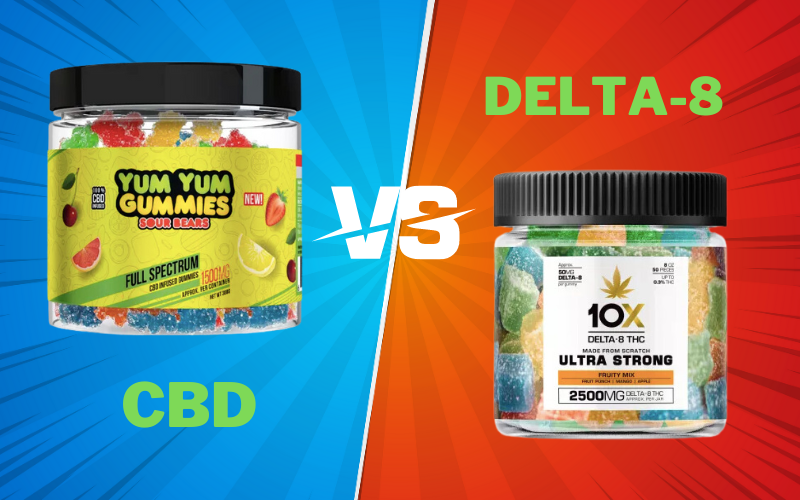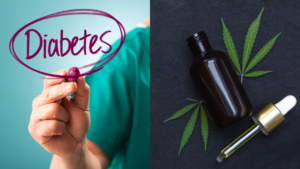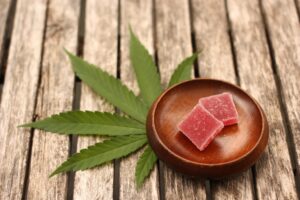Various substances that may be beneficial for health and wellness have recently come to light as a result of rising interest in cannabinoids. Cannabidiol (CBD) and delta-8 tetrahydrocannabinol (Delta-8) are two such substances that have drawn a lot of attention. Both CBD and Delta-8 are derived from the cannabis plant, but they possess distinct properties and effects. This article aims to provide an in-depth comparison of CBD and Delta-8, exploring their origins, mechanisms of action, potential benefits, legal status, and considerations for use.
Origins and Chemical Structure of both CBD and Delta-8.
CBD: Cannabidiol, commonly known as CBD, is one of the most abundant non-intoxicating cannabinoids found in both hemp and marijuana plants. It is extracted from the plant’s flowers, leaves, and stalks using various methods, such as CO2 extraction or ethanol extraction. CBD is known for its potential therapeutic properties and is widely used for its purported benefits, such as stress and anxiety relief, pain management, and support for overall well-being.
- Ra Royal CBD / Watermelon CBD Gummies 300mg - 1200mg

- Price: $35.99
- Cozy CBD / Dreams CBD Cartridge 600mg

- Price: $53.99
Delta-8: Delta-8 tetrahydrocannabinol, often referred to as Delta-8 or D8, is a minor cannabinoid found in trace amounts in the cannabis plant. Unlike CBD, Delta-8 is psychoactive, though to a lesser extent than the more well-known Delta-9 tetrahydrocannabinol (THC). Delta-8 is derived from CBD through a chemical conversion process that involves isomerization. This process transforms CBD into Delta-8, creating a compound that shares structural similarities with Delta-9 but exhibits distinct effects.
- Just Delta / Sour Burst Delta 8 Gummies 1000mg

- Price: $53.99
- Retail Price:$50.00
- Just Delta / Pineapple Express Hybrid Delta 8 Disposable Cartridge 6000mg

- Price: $138.99
- Retail Price:$119.99
- Flying Monkey / Blue Dream Indica THC-O + Delta-8 With THC-P Vape Cartridge 1g

- Price: $21.99
- Retail Price:$32.99
Mechanisms of Action
CBD: CBD interacts with the body's endocannabinoid system (ECS), a complex regulatory network that helps maintain balance and homeostasis. It indirectly influences cannabinoid receptors, particularly CB1 and CB2 receptors, by modulating their activity. CBD's effects are primarily attributed to its ability to enhance the endocannabinoid system's function, promoting a sense of balance and well-being. Unlike THC, CBD does not bind strongly to CB1 receptors, which is why it doesn't induce the typical "high" associated with cannabis use.
Potential Benefits
CBD: CBD is widely recognized for its potential therapeutic effects and has been investigated for its role in managing various conditions, including anxiety, depression, chronic pain, inflammation, epilepsy, and neurodegenerative disorders. Additionally, CBD's non-intoxicating nature makes it appealing to those seeking relief without the euphoria associated with THC.
Delta-8: While research on Delta-8 is limited compared to CBD, early studies and anecdotal reports suggest that it may offer benefits similar to those of CBD, albeit with a more pronounced psychoactive component. Some users claim that Delta-8 provides anxiety and pain relief, relaxation, and mood enhancement. However, more research is needed to fully understand its potential therapeutic applications.
Legal Status
CBD: In the United States, the legal status of CBD is complex and varies by source and intended use. Hemp-derived CBD containing less than 0.3% THC was legalized with the passage of the 2018 Farm Bill. However, CBD derived from marijuana remains federally illegal, although it is legal in some states that have approved medical or recreational cannabis use.
Delta-8: The legality of Delta-8 is a subject of ongoing debate. Some interpret the 2018 Farm Bill to include Delta-8 derived from hemp, while others argue that the isomerization process used to create Delta-8 constitutes a form of synthesis that falls outside the scope of the legislation. As a result, the legal status of Delta-8 varies by state, and users should be aware of local regulations before using or purchasing Delta-8 products.
Considerations for Use
Delta-8: Due to its psychoactive effects, Delta-8 should be used with caution. Users should be aware of their state's regulations and consider potential workplace drug testing implications. Like CBD, Delta-8's effects may vary based on individual factors, and responsible use is essential. As Delta-8 is less researched than CBD, it's crucial to exercise caution and consult a healthcare professional if considering its use, particularly for those with pre-existing health conditions or who are taking medications.
We are pleased to provide you with a list of our approved vendors:
- https://edensherbals.com/
- https://joyorganics.com/
- https://buycbdhub.com/
- https://higherhempcbd.com/
- https://www.binoidcbd.com/
- https://www.getcbdpet.com/
- https://www.cbdpure.com/
- https://purehempshop.com/
- https://www.diamondcbd.com/
Conclusion
CBD: CBD is generally considered safe and well-tolerated, with minimal side effects reported. However, interactions with certain medications are possible, so individuals should consult their healthcare provider before using CBD, especially if taking prescription drugs. Dosing can vary based on factors such as body weight, metabolism, and the specific condition being treated. Starting with a low dose and gradually increasing it is recommended to determine an individual's optimal dosage.
CBD and Delta-8 are two distinct cannabinoids that offer unique properties and potential benefits. CBD, with its non-intoxicating nature and well-established therapeutic potential, has garnered widespread attention and acceptance. On the other hand, Delta-8 presents an intriguing alternative for those seeking mild psychoactive effects coupled with potential therapeutic benefits. As research into these cannabinoids continues to expand, a clearer understanding of their mechanisms of action and potential applications will emerge, aiding individuals in making informed decisions about their use. Whether choosing CBD for its broad therapeutic effects or Delta-8 for a balanced psychoactive experience, users should prioritize responsible use and consult healthcare professionals when needed.






